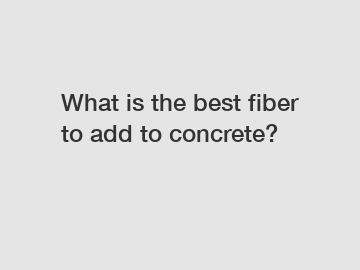What is the best fiber to add to concrete?
When it comes to strengthening and improving the durability of concrete, adding fiber reinforcement is a common practice in the construction industry. Fiber reinforcement helps to control cracking, increase durability, and provide additional support to concrete structures. However, with so many different types of fibers available on the market, choosing the best one for your concrete project can be a daunting task. In this article, we will discuss different types of fibers commonly added to concrete and determine the best fiber to use in various concrete applications.
**Types of fibers used in concrete**.
There are various types of fibers that can be added to concrete, each with its unique properties and benefits. Some commonly used fibers include:

1. **Polypropylene fibers:** Polypropylene fibers are synthetic fibers that are added to concrete to reduce plastic shrinkage cracking and improve impact resistance. These fibers are cost-effective and easy to mix with concrete.
2. **Steel fibers:** Steel fibers are strong and durable fibers that provide excellent tensile strength to concrete. They are commonly used in industrial floors, pavements, and tunnel linings where higher strength and toughness are required.
3. **Glass fibers:** Glass fibers are lightweight and have high tensile strength. They are commonly used in architectural panels, precast elements, and mortar to improve impact resistance and reduce weight.
4. **Natural fibers:** Natural fibers such as jute, sisal, and coir are eco-friendly alternatives to synthetic fibers. These fibers are lightweight and biodegradable, making them suitable for use in sustainable construction projects.
**Best fiber for concrete applications**.
The best fiber to add to concrete depends on the specific requirements of the project. Here are some guidelines for choosing the best fiber for different concrete applications:
1. **Polypropylene fibers:** Polypropylene fibers are ideal for reducing plastic shrinkage cracking in concrete, making them suitable for applications such as sidewalks, driveways, and residential foundations. They are also commonly used in shotcrete applications to prevent cracking and improve durability.
2. **Steel fibers:** Steel fibers are best suited for industrial floors, pavements, and tunnel linings where higher strength and toughness are required. They provide excellent crack control and impact resistance, making them ideal for heavy-duty applications.
3. **Glass fibers:** Glass fibers are lightweight and have high tensile strength, making them suitable for architectural panels, precast elements, and mortar. They improve impact resistance and reduce weight, making them ideal for applications where weight is a concern.
4. **Natural fibers:** Natural fibers are ideal for sustainable construction projects where eco-friendly materials are preferred. They are lightweight, biodegradable, and provide good impact resistance, making them suitable for a variety of applications.
**Conclusion**.
In conclusion, the best fiber to add to concrete depends on the specific requirements of the project. Polypropylene fibers are ideal for reducing plastic shrinkage cracking, steel fibers provide excellent strength and toughness, glass fibers are lightweight and high strength, and natural fibers are eco-friendly alternatives. By considering the project's needs and the properties of each fiber, you can choose the best fiber for your concrete application.
In summary, adding fiber reinforcement to concrete can significantly improve its performance and durability. If you're unsure about the best fiber to use for your concrete project, consult with a professional engineer or supplier to determine the most suitable option. Contact us for more information on fiber-reinforced concrete and how it can benefit your construction project.
Are you interested in learning more about stainless steel fiber for refractory, refractory stainless steel fiber, refractory anchors manufacturer? Contact us today to secure an expert consultation!



